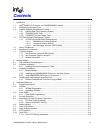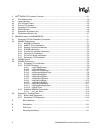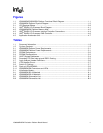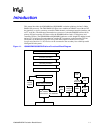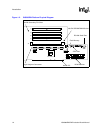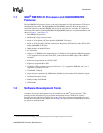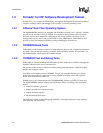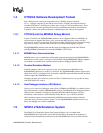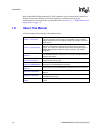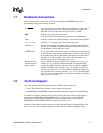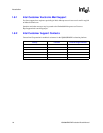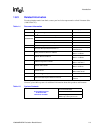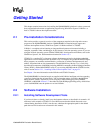
1-4 IQ80960RM/RN
Evaluation Board Manual
Introduction
1.3 Tornado* for I20* Software Development Toolset
Tornado for I
2
0 is a complete toolset featuring an integrated development environment including a
compiler, assembler, linker, and debugger. It also features a real-time operating system.
1.3.1 IxWorks* Real-Time Operating System
The IQ80960RM/RN platforms are equipped with Wind River Systems, Inc.’s IxWorks*. IxWorks
provides for the elements of the I
2
O standard: an event-driven driver framework, host message
protocols, and executive modules for configuration and control. IxWorks also allows for the
writing of basic device drivers and provides NOS-to-driver independence. TORNADO for I
2
O
provides a visual environment for building, testing and debugging of I
2
O drivers.
1.3.2 TORNADO Build Tools
TORNADO for I
2
O includes a collection of supporting tools that provide a complete development
tool chain. These include the compiler, assembler, linker and binary utilities. Also provided is an
I
2
O module builder, which creates I
2
O-loadable modules.
1.3.3 TORNADO Test and Debug Tools
TORNADO for I
2
O test and debug tools include the dynamic loader, the CrossWind∗ debugger, the
WindSh* interactive shell, and a system browser.
The dynamic loader allows for interactive loading, testing, and replacement of individual object
modules that comprise a driver.
CrossWind is an extended version of GDB960. Using it you can debug I
2
O drivers by setting
breakpoints on desired I
2
O components. A variety of windows display source code, registers,
locals, stack frame, memory and so on.
WindSh allows you to communicate to the IQ80960RM/RN platform via an RS-232 serial port.
The IQ80960RM/RN platform supports port speeds from 300 to 115,200 bps. The shell can be
used to:
• control and monitor I
2
O drivers
• format, send and receive driver messages
• examine hardware registers
• run automated I
2
O test suites
The shell also provides essential debugging capabilities; including breakpoints, single stepping,
stack checking, and disassembly.




